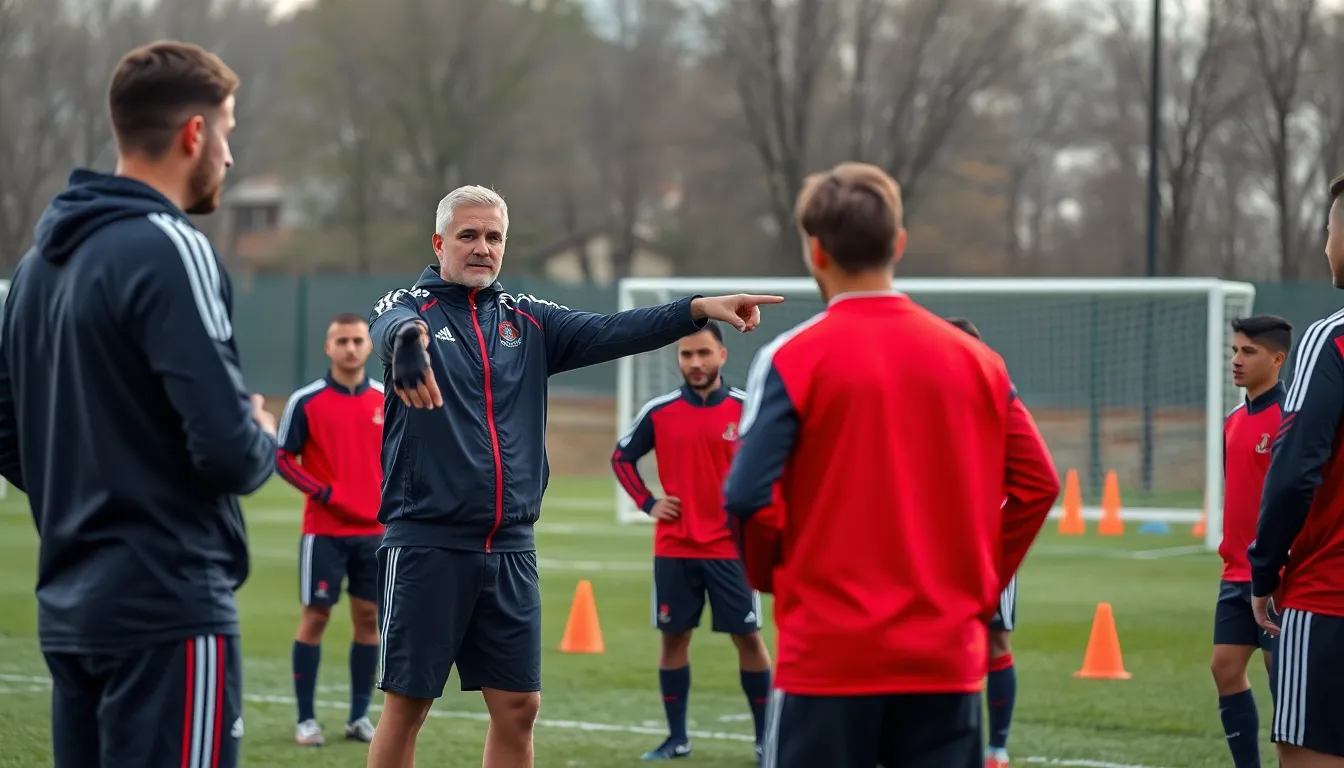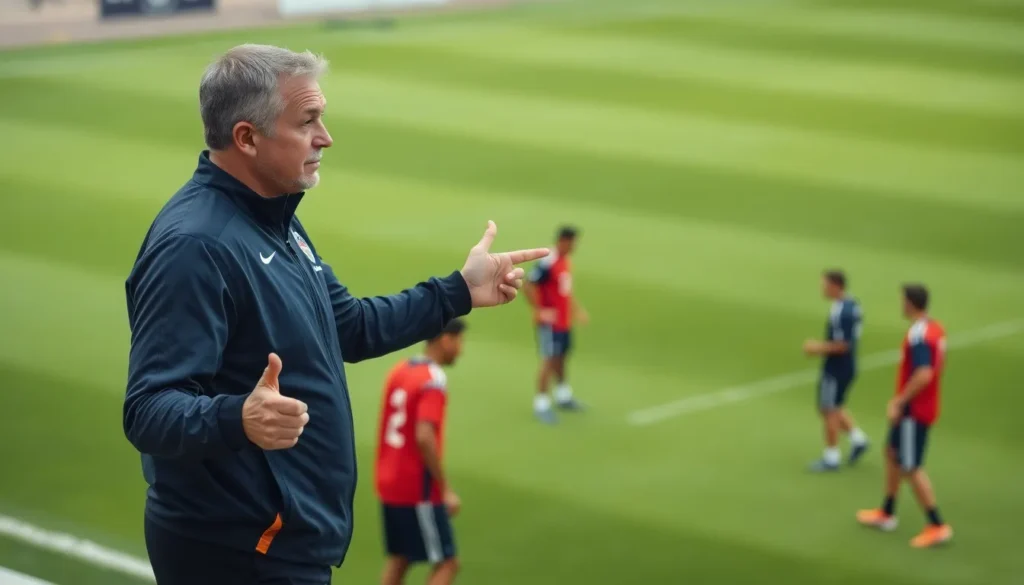Table of Contents
ToggleIn the world of football, it’s not just the players who need to train; the managers have their own playbook to master. Imagine stepping onto the pitch with the confidence of a seasoned pro, ready to whip your team into shape while outsmarting the competition. Football manager training isn’t just about tactics and formations; it’s about turning a group of individuals into a cohesive unit that can outscore, outsmart, and outplay any opponent.
What Is Football Manager Training?
Football manager training encompasses various development aspects, equipping individuals with essential skills. This training focuses on enhancing tactical knowledge, player management, and team cohesion.
Overview of Training in Football Management
Training in football management covers multiple areas. Tactical development prepares managers for game situations. Leadership skills foster positive relationships with players. Psychological understanding enables managers to motivate and support their teams. Exposure to media handling and public relations builds effective external communication skills. Managers access resources, including workshops and mentorship programs, ensuring competence in all essential areas.
Importance of Training for Managers
Training plays a crucial role in managers’ success. Equipped with knowledge, they gain confidence in decision-making. Managers who excel in strategy outmaneuver their opponents effectively. Understanding player dynamics leads to improved team performance. Training fosters adaptability, enabling managers to adjust tactics based on varying conditions. Professional growth through continuous education keeps managers relevant in evolving football landscapes. Enhanced interpersonal skills promote trust and effective communication within teams.
Components of Effective Training

Effective training encompasses various essential components that contribute to a football manager’s success. Key areas include tactical understanding, player development, and communication skills.
Tactical Understanding
A strong grasp of tactics enables managers to devise game plans that adapt to opponents and situations. Managers analyze data from past games to identify weaknesses and exploit them. Knowledge of formations and strategies helps create balanced teams that can execute plans on the pitch. Managers employ situational drills during training to reinforce tactical principles, ensuring players understand their roles in different scenarios. Continuous assessment of tactical effectiveness also remains vital as leagues evolve.
Player Development
Fostering player development plays a crucial role in maximizing team potential. Managers identify individual strengths and weaknesses to create tailored training programs. Constructive feedback promotes growth and enhances player confidence. Different coaching styles are utilized to match player personalities and learning preferences. Managers also emphasize the importance of physical fitness and technical skills, ensuring players remain competitive. By investing time in holistic development, managers cultivate skilled athletes who contribute significantly to team success.
Communication Skills
Communication skills directly impact a manager’s ability to lead and motivate their team. Clear instructions during training sessions foster understanding and execution of tactics. Effective managers build rapport with players, encouraging open dialogue for feedback and concerns. Verbal and non-verbal communication strategies remain vital, as they create an atmosphere of trust. Additionally, handling media interactions professionally showcases managerial competence both on and off the field. Strong communication helps maintain a cohesive team environment, facilitating better performance during matches.
Training Methods and Techniques
Football manager training involves various methods aimed at enhancing managerial skills and improving team performance.
On-Field Training Sessions
On-field training sessions focus on practical player development. These sessions facilitate tactical drills that allow managers to convey specific strategies and formations. Players engage in drills designed to improve their skills in real-time scenarios. Managers utilize these sessions to observe player reactions and adaptability in game-like conditions. Structured activities create an environment for reinforcing teamwork and effective communication. Real-time feedback from managers helps players understand their roles better on the field. Continuous practice builds muscle memory, which translates into improved performance during matches.
Video Analysis and Review
Video analysis plays a crucial role in enhancing managerial understanding of game dynamics. By reviewing past matches, managers identify strengths and weaknesses in their team’s performance. Detailed breakdowns of player movements and tactical decisions offer insights into areas needing improvement. Managers use software for precise analysis, highlighting crucial moments during games and training sessions. Discussing these analyses with players fosters a learning culture and encourages self-assessment. Visual feedback strengthens players’ tactical awareness and decision-making skills. Furthermore, video reviews enable managers to prepare tailored strategies against specific opponents.
Simulation and Scenarios
Simulation and scenario training allow managers to create realistic game situations for strategic development. These sessions focus on decision-making under pressure, mimicking authentic match conditions. Managers devise crisis scenarios that require quick thinking and adaptability. Players work through these challenges in a controlled environment, learning to respond effectively. Integrating technology enhances the simulation experience, enabling more dynamic game situations. Scenario-based training reinforces teamwork by requiring players to collaborate and communicate under duress. Managers observe these interactions to refine their approach to player development and tactical planning.
Evaluating Training Effectiveness
Evaluating the effectiveness of football manager training relies on specific metrics and player input. These evaluations highlight areas for improvement and reinforce successful strategies.
Key Performance Indicators
Key performance indicators (KPIs) serve as essential metrics for assessing training outcomes. Managers focus on win-loss records to gauge success during match play. Player statistics like goals, assists, and defensive contributions provide insights into individual and team performance. Another critical KPI is player progression, indicated through skill improvement and adaptation to tactical changes. Managers examine training attendance and player engagement to measure commitment levels. Overall, utilizing KPIs enables managers to make informed decisions regarding training methods and strategies.
Feedback from Players
Feedback from players contributes significantly to evaluating training effectiveness. Player surveys and informal discussions offer valuable insights into training experiences. Something crucial that managers must understand is player perceptions of tactical drills and their relevance to game situations. Open communication channels allow players to voice concerns or suggestions, fostering a collaborative environment. Regular performance reviews create opportunities for players to reflect on personal growth and team cohesion. Managers benefit when they consider this feedback to enhance future training programs and maintain a motivated squad.
Football manager training is vital for cultivating successful teams and enhancing individual player performance. By focusing on tactical knowledge leadership skills and effective communication managers can create an environment that fosters growth and teamwork. Continuous education and innovative training methods ensure that managers stay ahead in the ever-evolving football landscape.
Implementing metrics to evaluate training effectiveness allows managers to adapt their strategies based on player feedback and performance indicators. This adaptability not only improves team dynamics but also builds trust and rapport among players. As the game continues to change football managers must embrace training as an ongoing journey that shapes their capabilities and the future success of their teams.




